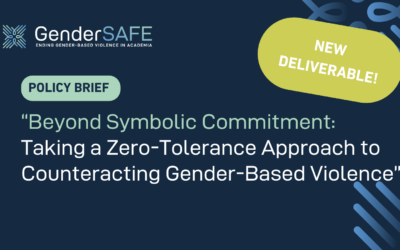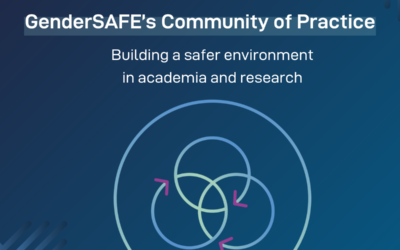As policy attention to gender-based violence in higher education and research is increasingly growing, GenderSAFE aims to advance these efforts by strengthening zero-tolerance policies with a unified policy approach across the EU.
Establishing a European baseline
GenderSAFE’s deliverable, “Report on Zero-Tolerance Approaches to Gender-Based Violence in Higher Education and Research,” seeks to establish an EU-wide understanding of zero-tolerance policies (ZTA) against gender-based violence, including sexual harassment. Authored by Bondestam, Fikejzová, Linková, and Strid (2024), this comprehensive report offers a brief background and description of the current scholarly debates related to the zero-tolerance approach, followed by a critical analysis of how HEIs in Europe are addressing gender-based violence with this approach, and key conclusions and recommendations. It focuses on two national contexts—Sweden (SE) and Ireland (IE)—chosen for their existing frameworks that reflect zero-tolerance principles. These case studies not only shed light on current practices but also highlight the gaps and challenges that still exist in fully realising a zero-tolerance culture.
The dual nature of zero-tolerance policies
The concept of zero-tolerance refers to policies that require action for any form of violations of set boundaries, regardless of the severity of the violation. Zero-tolerance policies are not completely new – they have been discussed since the early 1990s, with varying implementations and criticisms. The report delves into the conceptual complexities of such approaches, based on two main types identified by previous research: absolutist and symbolic. The absolutist approach involves strict, broad prohibitions of gender-based violence, often coupled with severe penalties for violators. On the other hand, the symbolic approach uses zero-tolerance rhetoric as a declaration of intent, though it may lack the robust mechanisms needed for effective enforcement.
This duality presents a significant challenge. Without clear definitions and practical frameworks, zero-tolerance policies risk becoming symbolic gestures rather than tools for real change. The report underscores the importance of moving beyond mere rhetoric to ensure that zero-tolerance approach policies lead to meaningful institutional change.
Insights from Sweden and Ireland: inspiring practices and pitfalls
The report provides a deep dive into the policies and their implementation in Swedish and Irish HEIs, revealing both inspiring practices and areas that require further attention. For instance, while desk research revealed that two-thirds of Swedish HEIs and half of Irish HEIs mention zero-tolerance in their policies, none of them offer explicit definitions or comprehensive frameworks to guide these policies. Only one Irish HEI institution explicitly reported using a ZTA framework in the questionnaire, employing a systematic and intersectional approach to address gender-based violence. This lack of clarity presents both a challenge and an opportunity for institutions to refine and reinforce their commitments.
In Sweden, the emphasis on a zero-tolerance approach has served as a catalyst for broader policy development around gender-based violence. It has pushed HEIs to replace narrower concepts like sexual harassment with more encompassing frameworks, driving the need for common guidelines on sanctioning perpetrators. Meanwhile, in Ireland, the role of senior management in enforcing ZTA has been highlighted as crucial in addressing gender-based violence, suggesting strictness and taking the issue seriously at all levels.
Overcoming challenges and moving forward
One of the key challenges identified is the symbolic use of a zero-tolerance approach without proper operationalisation, which can lead to non-reporting and other unintended consequences. Additionally, aligning ZTA with a victim-centred approach in hierarchical academic settings remains difficult. The report also notes the clashes between national policies and institutional frameworks, particularly in Ireland, where the Department of Justice’s policies sometimes conflict with the Higher Education Authority’s consent frameworks.
However, the report does not merely highlight problems—it offers a path forward. Among its recommendations are the need for clear definitions of ZTA, embedding these policies within broader institutional change strategies like Gender Equality Plans, and ensuring continuous monitoring and evaluation of their effectiveness.
The road ahead
GenderSAFE’s deliverable is more than just an analysis—it’s a call to action for HEIs across Europe. The report reveals that while some progress has been made, significant gaps remain in the implementation and understanding of zero-tolerance policies. By addressing these gaps and following the report’s recommendations, institutions can move closer to creating truly safe and equitable environments for all.
In collaboration with a community of practice involving higher education institutions, students, and national authorities, the GenderSAFE project is setting out to explore how the baseline principles can be contextualised and operationalised, how challenges can be addressed and problems overcome, and how different perspectives (including from students) can be integrated in policy design and implementation.
For those interested in a deeper exploration of these issues, the full report is available on Zenodo: https://doi.org/10.5281/zenodo.13380251.
Cite as: Bondestam, F., Fikejzová, M., Linková, M., Strid, S. (2024). Report on zero-tolerance approaches to gender-based violence in higher education and research. GenderSAFE Deliverable D2.1. Submitted to the European Commission 30.08.2024. 28 pages. Zenodo: https://doi.org/10.5281/zenodo.13380251



